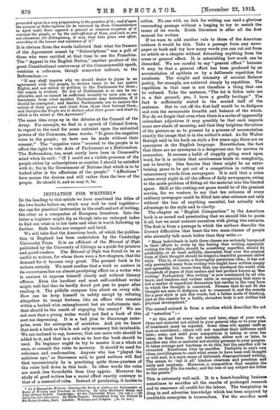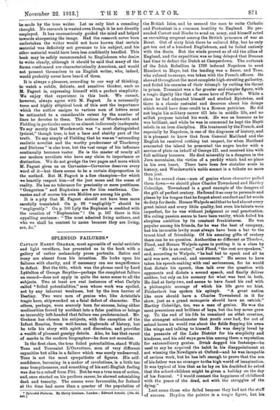INITIATION FOR WRITERS.*
IN the heading to this article we have combined the titles of the two books before us, which may well be read together— the one for practical instruction in the craft and art of writing, the other as a conspectus of European literature. Into the latter a beginner might dip as though into an enlarged index to find out what is to his taste and what is worth following up further. Both books are compact and lucid.
We will take first the American book, of which the publica- tion in England has been undertaken by the Cambridge University Press. It is an offshoot of the Manual of Style published by the University of Chicago as a guide for printers and proof-readers. The Manual of Style was found to be so useful to writers, for whom there were a few chapters, that the demand for it became very great. The present book is for writers entirely. We must confess that a work so austere in its correctness has an almost paralysing effect on a writer who is anxious to express himself clearly and without literary offence. Even the hardiest and most self-confident writer might well feel that he hardly dared put pen to paper after reading it. The pitfalls compass him about on every side. How can he keep himself in safety except by refusing altogether to tempt fortune, like an officer who remains within a barbed wire entanglement lest an unfortunate inci- dent should be the result of engaging the enemy ? We are not sure that a young writer would not find a book of this sort too depressing. It is a bad plan to discourage enter- prise, even the enterprise of mistakes. And yet we know that such a book as this is not only necessary but invaluable. We are inclined to say, however, that one more rule should be added to it, and that is a rule as to how the book should be used. No beginner ought to try to master it as a whole at once, or commit the rules to memory. It should be used for reference and confirmation. Anyone who has "played the sedulous ape," as Stevenson said, to good authors will find that unconsciously he is practising quite three-quarters of the rules laid down in this book. In other words the rules are much less formidable than they appear. Moreover the study of good writers has a moral effect exactly contrary to that of a manual of rules. Instead of paralysing, it incites to • (1) A Manual for Writers : Covering the Needs of Authors for Information on Rules of Willing and Practices in Printing. By John Matthews Manly and John Arthur Powell. Cambridge : At the University Press. [58. net.]—(2) Initiation inM Literature. By Emile Fa.guet. Translated from the French by Sir Home Gordon, Bart. London : Williams and Norgate. Eas. 61. net.1
action. No one with an itch for writing can read a glorious resounding passage without a longing to try to match the music of its words. Noble literature is after all the first manual for writers.
If we were to add another rule to those of the American authors it would be this. Take a passage from any news- paper or book and try how many words you can cut out from an article or a chapter without detracting anything from the sense or general effect. It is astonishing how much can be discarded. We are careful to say "general effect" because it may be that a general effect has been produced by an accumulation of epithets or by a deliberate repetition for emphasis. The weight and intensity of ancient Hebrew poetry, for example, are achieved simply by repetition. The repetition in that case is not therefore a thing that can be reduced. Take the sentence, "The lot is fallen unto me in a fair ground; yea, I have a goodly heritage." The fact is sufficiently stated in the second half of the sentence. But to cut off the first half would be to disfigure and ruin the memorable breadth and balance of the whole.
Nor do we forget that even when there is a series of apparently redundant adjectives it may possibly be that each imports some new shade of meaning, and that they heighten the colour of the picture so as to present by a process of accumulation exactly the image that is in the author's mind. As Sir Walter Raleigh said in his book on style a few years ago, there are no synonyms in the English language. Nevertheless, the fact that there are no synonyms is a dangerous one for novices to remember. It excuses a habit of sloppily piling word upon word, for it is certain that carelessness tends to complexity, not to brevity. One fancies that there might be an enter- taining game to be got out of a competition in cutting out unnecessary words from newspapers. It is said that a crisis arises every night in all the offices of daily newspapers, owing to the acute problem of fitting all the material into the limited space. Skill at the cutting-out game would be of the greatest service, for we venture to say that ten columns of every ordinary newspaper could be fitted into nine columns not only without the loss of anything essential, but actually with advantage to the style and to clarity.
The chapter on "English Composition" in the American book is so sound and penetrating that we should like to quote it all, but we must content ourselves with giving two extracts.
The first is from a passage in which the authors describe the literary difficulties that beset the two main classes of people who normally talk much better than they write :—
" Many individuals in both these classes are seriously hampered in their efforts to write by the feeling that writing, especially writing for the public, should be something superfine, should bo artificially, or at least artfully, decorated, that over the original form of their thought should be draped a beautiful garment called style. This is, of course, a thoroughly pernicious idea; it has not only prevented many from writing who might have written simply and agreeably, but, worse than that, has burdened the world with thousands of pages of that useless and bad product known as 'fine writing.' Fortunately 'fine writing' is now condemned by all who know, and teachers and writers unite in recognizing that style is not a matter of superficial decoration but resides in the very form in which the thought is conceived. Phrases that do not fit the thought are seen to disfigure, not to ornament it, and the remedy for a poor style is not fine words, but a better mode of thinkiag, just as the remedy for a feeble, shrunken body is not clothes but physical development."
The second extract is from a section which describes the art of "selection" "At this, and at every earlier and later, stage of your work, ideas and material not suited to your general idea or to your plan of treatment must be rejected. Some ideas will appear unfit as soon as considered ; others will not manifest their unfitness until later; some, not until your composition is taking or even has taken its final form. Do not hesitate, either now or later, to sacrifice any idea or material not strictly germane to your purpose. It takes courage and hardness to do this, but the sacrifice will be rewarded. Excellence lives by sacrifice. Partiality to one's own ideas, unwillingness to omit what seems to have been well thought or well said, is a main cause of deformed, disproportioned writing. The mania to 'tell it all' hinders clearness and precision and unity and emphasis. Moreover, a composition that empties the writer rarely fills the reader; and the lees of any subject are bitter to the palate."
This is extremely well said. It is a heart-breaking business sometimes to sacrifice all the results of prolonged research and to renounce all credit for the labour. The temptation to
drag in and advertise knowledge which has been acquired by creditable enterprise is tremendous. Yet the sacrifice must
be made by the true writer. Let us only hint a consoling thought. No research is wasted even though it be not directly employed. It has unconsciously guided the mind and helped towards sharpening the image. Had the research never been undertaken the writer would not have known that certain material was definitely not germane to his subject, and his other material would have been less confidently handled. This book may be safely recommended to Englishmen who desire to write clearly, although it should be said that many of the forms condemned are characteristically American, and would not present themselves to an English writer, who, indeed, would probably never have heard of them.
It is always a pleasure, according to our way of thinking, to watch a subtle, delicate, and sensitive thinker, such as M. Faguet is, expressing himself with a perfect simplicity. We enjoy that experience in this book. We cannot, however, always agree with M. Faguet. In a necessarily terse and highly elliptical book of this sort the importance which the author assigns to various men of letters must be estimated to a considerable extent by the number of lines he devotes to them. The notices of Wordsworth and Fielding in particular seem to us almost ludicrously inadequate. To say merely that Wordsworth was "a most distinguished lyricist," though true, is but a bare and shabby part of the truth. To say simply of Fielding that he was an" astounding realistic novelist and the worthy predecessor of Tbackeray and Dickens" is also true, but the vast range of his influence continually becomes vaster. He is the master of nearly all our modern novelists who have any claim to importance or distinction. We do not grudge the two pages and more which M. Faguet gives us on Cervantes—Cervantes deserves every word of it—but there seems to be a certain disproportion in the method. But M. Faguet is a fine champion—for which we heartily respect him—of the just mean and the sense of reality. He has no tolerance for preciosity or mere prettiness. " Gongorism " and Euphuism are for him anathema. Cer- vantes and of course his own Moliere are among his gods.
It is a pity that M. Faguet should not have been more carefully translated. On p. 98 " negligibly " should be "negligently." On p. 100 Lyly the Euphuist is credited with the creation of "Euphemism" ! On p. 167 there is this appalling sentence : "The most admired living authors, and who we shall be content to name because they are living, are, &c."



















































 Previous page
Previous page